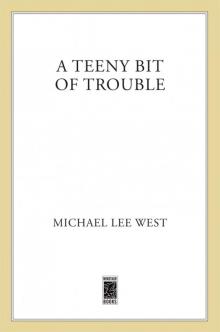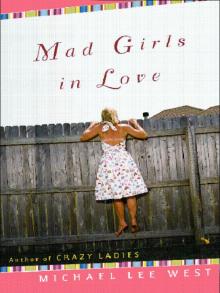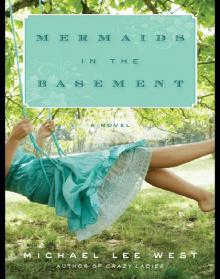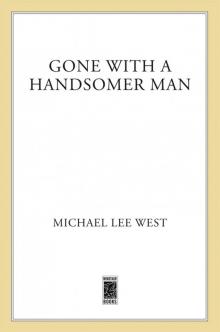- Home
- Michael Lee West
A Teeny Bit of Trouble Page 11
A Teeny Bit of Trouble Read online
Page 11
And leave the birthplace of truth and slander? Miss all the gossip? “No,” I said. “We don’t have plans.”
Emerson spun around, her lips spread into a smile.
“You’re a precious little girl,” Josh said. “And lucky. You’ve got two daddies. I wish I’d had me a spare.”
She stopped spinning and glared. “Too bad you’re not a starfish,” she said. “Then you could grow new legs.”
“Emerson!” Lester cried.
“It’s quite all right,” Josh said. “She’s just a child. She knows not what she does.”
Red looked as if he’d just stepped into a gopher hole. But the poor man had only seen the barest glimpse of Bonaventure. Weird, shimmery vibes were as normal as the church bells that gonged in the distance, calling the faithful and the fanciful—not to prayer service, not to Bible study, not to confession, but to the weekly bingo game.
* * *
Mr. Winky unlocked the plastic thermostat covers and cranked up the air-conditioning. “Hurry up, Vlado,” he called to a short, blond man. The duo turned into the hall and vanished.
Minutes later, Josh parked his chair beside the front door and directed people to the appropriate viewing room.
I sat in the middle of the Stonewall Jackson Room, squished between Coop and Red. The Philpots were up front, but I couldn’t see Emerson because there were so many people between us. All around us, mourners perched in the white chairs, their voices rising and falling like musicians tuning their instruments in an orchestra pit. The chandelier dimmed for a second, and the voices gathered strength, building into an overture.
Bonaventure’s finest rumormongers had gathered in front of me, and they were warming up, tweaking and plucking words, tuning the language.
“… strangled herself with Hanes pantyhose.”
“… control-top L’eggs.”
“… crotchless tights from Frederick’s of Hollywood.”
The conversation snapped off when Kendall McCormack stepped into the room. Her hair was spiked into the Statue of Liberty style, a local favorite on prom night. She lurched down the aisle on four-inch heels, her black minidress grazing the tops of her thighs. Her glossy black fingernails picked at a long strand of pearls that hung around her neck. When she spotted Lester she released the pearls and tottered over to him. She whispered something. His head wrenched back, as if she’d thrown a Rocky Road Pie in his face. He snatched her arm, his fingers sinking into her flesh, and he escorted her back up the aisle.
“This is less than six degrees of separation,” Red whispered. “You and Coop. Coop and Barb. Lester and Barb. Lester and Kendall. In an indirect way, all of you have boned each other.”
My gaze drifted to the far side of the room. Norris rose from a chair and slithered toward the casket. He was quickly surrounded by four elderly, bespeckled men, who kept gesturing at their eyes. An old woman joined them and smacked her cane against Norris’s leg.
Suddenly I couldn’t breathe. I touched Coop’s arm. “I’m going to the powder room.”
I ignored his worried look and squeezed past him, into the crowded aisle. When I got to the vestibule, it was jammed, too. The front door stood open, letting in a blast of warm night air. I eased my way to the porch. City crickets shrilled from the oak trees, as if shocked by human beings and their strange death rituals.
A blond man got out of a rocking chair, his ponytail streaming over his shoulder, and stepped into the light. His eyes were dark green, the exact color of champagne bottles, and thickly lashed. He wore a beige linen jacket, tight jeans, and scuffed brown cowboy boots.
“Teeny Templeton?” His voice was deep and clear, one hundred percent pure swamp rat.
God no. Not him. Not tonight. Not Son Finnegan.
I stepped back. The crickets fell silent, as if waiting for my response.
“Don’t act like you don’t remember me.” He laughed, but his eyes said, Peter the Denier.
Hell, yes, I remembered every overendowed part of him. Son, not a nickname for Sonny or a misspelling of the sun. When he’d been born, his mama, Cissy Finnegan, hadn’t been able to think of a suitable name, so she’d written Son on the birth certificate.
“When did you get back in town?” I asked. Did he still have washboard abs and a gorgeous ass?
“I was just about to ask you the same thing,” he said. “But since you beat me to it, I’ll go first. I’ve been in Iraq. I moved home this past spring. I tried to look you up, but I heard you’d moved to Charleston.”
“Iraq?” I said. “You looked me up? I haven’t seen you since I was twenty.”
“Yeah, those were good times. Just me and you working together in the orchard.”
My brain went on a fact-finding mission. There had been some scandal about Son’s dad.… The file dropped into place. His daddy had died in the state penitentiary for cattle rustling, and his mom had taken in laundry and cleaned houses.
“I was an army surgeon,” Son said. “I clocked a lot of hours reconstructing faces. Now, I’m tweaking. Eyes, noses, Botox.”
I cut my gaze at his broad shoulders and sharp green eyes. All those years ago, we hadn’t been able to keep our hands off each other. He’d been an older man, twenty-six, in his last year of medical school, and he’d given roll in the hay an all-new meaning. Son and I would meet in my aunt’s barn after the pickers had left for the day. Hours later, we’d emerge, our bodies gleaming with sweat as if we’d been swimming. Just when I’d started to feel something for him, Aunt Bluette had put an end to the budding romance.
“I’ve got a brand-new office near Bonaventure Regional,” Son was saying. “I’m board certified in plastic surgery.”
“I’m glad for you.” And I was. He could have turned out like the other Finnegan boys, breaking into houses to finance their meth addiction, but Son had used his smarts to rise in the world.
“Your turn.” He leaned into me. “Why are you in town? I don’t suppose your visit has anything to do with Barb Philpot’s little girl?”
I felt an “oh shit” smile coming on, and I instantly repressed it.
“Surely you’re not surprised that I know about you and Coop and Barb.” Son wiggled his brows. “If PhDs could be handed out for gossip mongering, every citizen in Bonaventure would have a diploma.”
“No comment,” I said.
“You’ve been hanging out with too many lawyers. Let’s get out of here and have a drink. Catch up on the dirt.”
“No thanks.” I had the feeling that someone was gawking at us, and I glanced over my shoulder. A piano teacher was talking to the mayor. I started to chastise myself for being paranoid when Norris stepped around the mayor. I thought of the woman he’d raped, and I made a fist. But Norris wasn’t looking at me. He ran down the porch steps, putting me in mind of a tall possum. He scuttled past two Sweeney policemen and scurried to the parking lot.
I squinted at the officers. Surely they weren’t here to pay their respects. Did this have something to do with the coroner’s belated findings?
Son caught my arm, then looked down at my fist. “Is something wrong?”
“No.” Yes, I just saw a predator with sharp teeth, a pointy nose, claws, and (I wouldn’t be surprised) a bald tail. My fingers sprang open, and I smoothed my palm down the side of my dress.
Son pressed two fingers against my wrist. “Your pulse is doing a Texas two-step. I asked you for a drink. Not your blood.”
I pulled my hand out of his grasp.
“What’s wrong, Teeny? You look pale. Can I get you a glass of water?”
I glanced away. Did he think I was having a panic attack over him? I reached inside myself and searched for a tranquil spot, the one Aunt Bluette had helped me find so long ago.
Think about black bottom pie. Think about red velvet cake. Think about Hershey’s sauce trickling over a scoop of mocha chip ice cream.
There, much better. I gave Son a real smile. “I wouldn’t mind some chocolate.”
“I’
ll buy you a Godiva store. But O’Malley might not like it.”
“Just give me the candy and nobody’ll get hurt.” An ancient image replayed in my mind, Son pulling a sweat-soaked shirt over his head, his muscles moving under his tanned skin, and me pinching the metal tab of his zipper, sliding it down halfway.
He put one hand on the wall and his ponytail swung between us. “Want some advice? Don’t put all your peaches in one cobbler.”
“If you were a peach, I’d purée you in a Waring Blender.”
“No, you’d eat me.” He winked.
I looked under his arm and saw something that made my lungs feel like shrunken pods, the kind that wither in hot sun. Coop stood two feet away, his arms crossed, foot tapping the wooden porch in an unmistakable “what the hell are you doing” rhythm.
twelve
I turned away from Son and bumped my knee against the rocker. It banged against the house. My heart was beating just as hard.
Do something, Teeny. Channel Doris Day. She-Who-Can’t-Be-Lied-To is about to tell a whopper.
“Coop, there you are.” I waved, but cracks ran through my voice. I’d missed Doris by a thousand miles.
“I thought you were in the ladies’ room.” Coop’s foot went still. He gave Son a scornful look.
If I told a lie, I’d have to raise my tally. So I gave Son a pleading look. “Take care, Dr. Finnegan.”
“You, too, Miss Templeton.” He pulled my hair. “And try not to purée any peaches. That’s too brutal.”
Coop slipped his arm around my waist and drew me across the porch, but not before I saw Son’s lips curve into a machete-sharp smile.
“What were you and Son Finnegan talking about?” Coop asked.
“He was in Iraq.” That wasn’t an answer, but it was the truth. Sort of. Lord, my mouth was dry. I looked over Coop’s shoulder. “Where’s Red?”
“He’s coming.”
“Give me two minutes,” I said. “I want to say bye to Emerson.”
“Sure, but we’re meeting my parents for dinner.”
“We are?”
“Mother called while you were in the ladies’ room. I didn’t think you’d mind. But if you do, I can cancel.”
“No, no, no.” Had I just told lie number twenty-five? Dr. O’Malley had always been kind, but Miss Irene hadn’t liked me since that day I’d hollered in church. I went ahead and raised my tally, then I walked back to the Stonewall Jackson Room.
Emerson’s grandmother, Helen Philpot, stood near the coffin. She was tall and big-eyed, a killer tennis player with muscular forearms and leathered skin. Her bouffant, apricot-tinted hair was curled to perfection, and she reminded me of an entry at the Westminster Dog Show.
Emerson leaped out of her chair and grabbed my hands. “Bad news, Teeny. I’m not coming home with you and Coop.”
Helen rolled her eyes. “Oh, for heaven’s sake, Emerson. That’s not bad news for them. Sit back down in that chair and be still.”
“No,” Emerson said.
Helen raked her manicured nails down the sides of her navy jacket. Emerson recoiled, as if she’d felt the sharp sides of those talons, and plopped in a chair.
Helen turned to me. Her irises looked like chopped green olives. “You must be Teeny Templeton.”
“Yes, ma’am.”
“Emerson won’t stop talking about you. Thanks for taking care of her.” Helen tucked her arm into mine and guided me toward the casket. “Do you play tennis?”
“Not in a while.”
“Barb used to play. She always made foot faults. She made them in real life, too. Thanks to her, I might not be a grandmother.” Helen frowned at the mahogany casket. The upper lid gaped open. Inside, Barb’s head rested on a white satin pillow. A scarf was draped around her neck.
I glanced away.
“I never liked Barb,” Helen said. “She was tricky. Even in death she looks like she’s up to something. And she was always in motion. Like a great white shark.”
Barb had once bragged that her lineage went back to Attila the Hun. I wondered how she’d handled Helen.
“I’ve got Emerson’s things in the van,” I said. “Shall I fetch them?”
“How clever of you to change the subject. You’ll make a fine lawyer’s wife. Unless you’re just Cooper’s rebound woman.” Helen’s voice held a fleeting edge of sweetness, like sugar water dribbled over gravel.
I stiffened. Helen had nailed one of my biggest fears.
She patted her hair. “I was surprised to hear he’d gotten divorced. He’s half Catholic, you know.”
“Yes, ma’am.” I shifted my gaze to the other end of the room. The Sweeney policemen were talking to Lester, who kept swiping a handkerchief over his forehead.
Helen pulled me into the far corner, out of Emerson’s earshot. “Are you worried that Cooper will turn out to be her daddy?”
“Not at all.”
She stared hard at me. “Either you’re a liar or you’re in love. But don’t worry. It’s highly unlikely than he’s related to that child. She’s got gray eyes, but other than that, she doesn’t look like the O’Malleys. She sure doesn’t look like a Philpot. And you know why?”
“No, ma’am.”
“Almost eleven years ago, Barb went into labor on Curry Island. It was early September, hot as blazes. We were gathered at my beach house, eating oysters and boiled crabs. Right in the middle of dessert, Barb’s water broke. When we got to the little hospital, it was pandemonium. The nurses put the patients on cots. Some of the poor dears gave birth in the hall. Barb got preferential treatment because Lester knew who to call.”
Something broke loose in my chest, as if a hard little egg had cracked. If I didn’t hold real still, it would shatter. “But Emerson said that her birthday was in December.”
“That’s what the poor child thinks. But she was born on September fourth—a scant seven months after the wedding. Barb was afraid people would call Emerson a bastard, and they would have. So Lester hired a big-shot lawyer to fix everything. Emerson got a new birth date. Highly illegal, of course. But we went along with it. We had to. We thought Emerson was our baby.”
I pulled in a breath. The egg in my chest tore open, and feathered things banged against my ribs. Everything Emerson knew about herself was a lie.
Helen stepped closer. “The OB ward was understaffed the night Emerson was born. I parked myself beside the nursery window and watched a nurse take off the babies’ ID tags and put them in a heap. I tried to keep track of Emerson’s tag, but the nurse saw me gawking and shut the curtains. After that, I couldn’t be certain if we’d gotten the right baby.”
“You could’ve checked footprints,” I said.
“Oh, we did. But one baby’s prints got on all the records. So Lord knows where Lester’s real child is—or Coop’s.” Helen’s bony fingers closed on my wrist. “Barb and Emerson stayed at the beach house for a few months. Then they returned to Bonaventure. The gossips never said a word. Wasn’t that nice?”
I nodded.
“Every time I go to Curry Island, I drive by the elementary school and look for a tall, green-eyed girl. I haven’t found her. But I know she’s out there.”
Her words slashed around me. Lies. So many lies, each one sticky-sharp. I must have flinched, because she abruptly let go of my hand. I moved away from her and walked to Emerson’s chair.
“I’ve got to leave, honey.” I smoothed her pigtails. “Give me a call sometime. My number’s in the phone book.”
I expected her to say “as if,” but she sprang out of her chair and wrapped her arms around me. “I’ll really miss you. And tell my daddy that we have unfinished beeswax.”
I stepped out of the funeral home, into the warm night air. I had the nagging feeling that I’d forgotten something, but I couldn’t think straight. My head was filled with Helen’s prickly words. The humidity sluiced around me, and I could feel my hair tighten and curl. I reached up, making sure my bobby pins were in place.
My thoughts scattered when I saw Coop. He stood at the end of the porch, leaning against a wooden column. He smiled at me. “Ready?”
I slipped my hand into his. As we walked toward the parking lot, I told him about Curry Beach. His eyebrows went up, but he didn’t comment. I smoothed my hair again, but this time the pins flew out and clattered against the asphalt. Coop bent down to gather them; I hunkered beside him. He slid a bobby pin into my hair.
“There you go,” he said, his hand lingering on my cheek, giving off the faint scent of pine-and-cotton.
I pushed down my worries about Emerson and forced out a smile. “Where are we having dinner?”
“Mother made reservations at Heads ’N,’ Tails.”
Now I’d totally lost my appetite. Heads ’N’ Tails was a trendy restaurant in the historic district, and items on the menu used every piece of the animal.
When we got to the van, Red said, “Sit up here with me, girlie.”
Coop helped me into the front seat, then he got into the back. From the radio, Drowning Pool whispered the opening lyrics to “Bodies,” and Red turned up the volume. The pins wouldn’t stay in my hair, so I plucked them out. I pulled down the rearview mirror. My image bore an uncanny resemblance to Emerson’s hedgehog, which, I suddenly realized, was still in the backseat, along with her backpack. So that’s what I’d forgotten. But it gave me the perfect excuse to see her again.
Red drove around Oglethorpe Square, the van’s tires bumping over the cobblestones. We parked by The Little Savannah, a popular bistro, where customers were lined up on the sidewalk. Across the street, rosy floodlights washed over the stucco façade of Heads ’N’ Tails. The building resembled a plump roast in a butcher’s case.
Red spread his arms. “Look at all the tourists laughing and carrying on. They don’t seem worried about being mugged. Bonaventure must have a low crime rate.”
“We’ve got our share of criminals,” Coop said. “But no one ever hears about them. The tourism council created a brand—“‘Bonaventure is a smaller, safer Savannah.’”
This was true. The Gazette was written by staffers with MFAs in creative writing. The crime log was carefully zany: a unicycle had either been stolen or borrowed; a man in a frog suit had eaten all the seedless grapes at Piggly Wiggly; a woman had forced her cheating boyfriend to eat habanero peppers, and he’d filed assault charges.

 A Teeny Bit of Trouble
A Teeny Bit of Trouble Mad Girls In Love
Mad Girls In Love Mermaids in the Basement
Mermaids in the Basement Gone With a Handsomer Man
Gone With a Handsomer Man